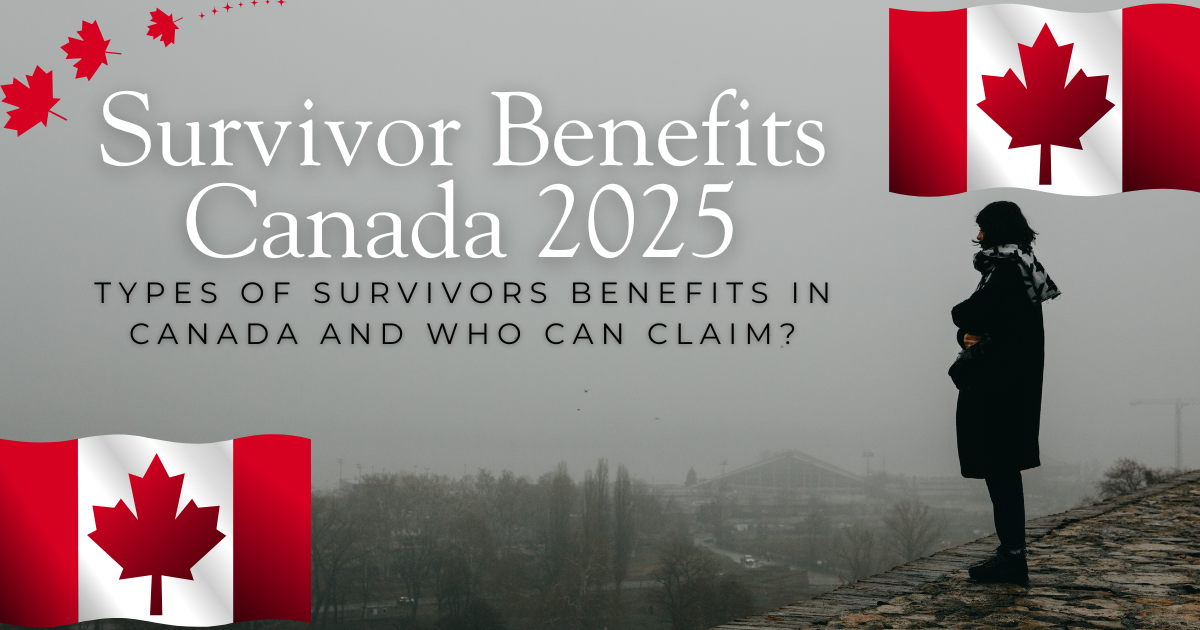Survivor benefits are payments given to the deceased family member’s legal spouse/common-law partner, or children. It is financial security a person can apply for to make a future arrangement for their family members. If you are not a legal spouse and the deceased person had no legal common-law partner at the time of the death, you may qualify for the survivor’s benefit.
Survivor Benefits Canada 2025
To start claiming the monthly pension, the survivor is responsible for either applying themselves or may have a representative apply for the benefits. The CPP can only issue back payments for a maximum of 12 months. That’s why survivors are advised to apply as soon as possible after the contributor’s death, as delays may result in the loss of benefits.
If a plan member dies, the government of Canada (Pension Centre) must be immediately notified. If the plan member was still employed at the time of death of the contributor, please contact the Public Service Pay Centre to get information related to any additional pay-related benefits that may be available.

Types of Survivor Benefits in Canada
Types of survivor benefits in Canada are as follows:
Survivor’s Pension
Survivor payments are provided to spouses and/or dependent children as a lump sum and a monthly payment. There will be different payments for each claim.
Funeral Costs
The valid costs related to burial or cremation are covered under the survivors’s benefits by the Canada Revenue Administration. The cost for transportation of bringing family members home for burial is also paid by CRA.
Children Benefit
Child benefit is a monthly payment given to an eligible child of the deceased. The maximum payment for this benefit is $310.77 in 2025. The children who are under 18 or full-time students are eligible for this payment.
Who can Claim Survivor Benefits Canada 2025?
To claim the survivors benefits, an individual must meet the eligibility criteria set by the Canada Revenue Administration. The criteria are as follows:
Spouse or Common-law partner
According to the Canada Pension Plan (CPP) legislation, you must be either a spouse or common-law partner in order to receive the survivors benefits. The gender of the person does not matter here. The spouse or common-law partner must have lived with the deceased in a marital relationship for at least 1 year. It is the responsibility of the survivor to provide valid proof of the relationship. To prove your common-law relationship, you will need to fill out the form given below:
The Statutory Declaration of Common-law Union form – single signature (ISP3104CPP)
If the deceased had no common-law partner but had a separated legal partner, he/she would be qualified for this benefit.
If you received a CPP credit split
If you are a separated legal spouse, you’re eligible for the benefit. However, if you had a CPP credit split received and approved in April 2025 or later with the same deceased contributor, you are not eligible for the survivor’s pension.
You are only eligible for this pension if you reunited with your separated legal spouse and then lived together for at least 12 months immediately before their death.
If you are widowed more than once
If you have married more than 1 person and they have died and you are eligible to get 2 or survivors benefits, you will still get only one survivor’s pension. The pension with a larger amount will be paid to you.
If you previously remarried
Before 1987, if you remarried someone after the death of your legal spouse or common-law partner, you were disqualified from the pension. But now you can get remarried and still get the survivors pension payment. To find out about your eligibility, contact the Canada Pension Plan.
Children’s Benefits
If you’re an eligible child of the deceased, you may be qualified for the child allowance. For this, you must meet the eligibility criteria for child allowance:
- The child must be under the age of 18. The benefits will not be given to them; instead, they will be given to the survivor in place of the children.
- The children who are 18 years old or older and under age 25 are also entitled to this benefit. They can receive the payment directly under the condition that they must be full-time students.
In case there are no survivors or eligible children, the public service pension plan ensures a minimum benefit is payable to the beneficiaries, and then the benefit will go to the deceased member’s estate.
FAQs
Can I claim the survivor benefits for a lifetime?
No, the payment will stop the month after the survivor turns 65.
Do I have to apply to get survivor benefits?
Yes, you will have to apply for survivor benefits in order to start receiving them. However, if you are already getting spousal benefits, the SSA, after receiving the proof of death, will automatically switch you to survivor benefits.


